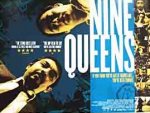Festival History
Whether you're new to the event or want to revel in remembrance of films past, former Keswick Film Club Chairman Rod Evans takes you on a journey through the past.
KFF4 February 2003
The 2002 festival (KFF 3) had seen a considerable fall in attendance, compared to KFF 2, so something had to be done to bring us back to a sounder financial footing. Considerable head-scratching led to the following conclusions: we needed to programme films more accessible to the public (although there was no doubting the quality of KFF 3's films); funding from outside organisations was essential; a director with a back-catalogue of highly-regarded work should be invited; closer co-operation with staff and students at the Carlisle College of Art was important; better promotion through advertising and involvement of the press was an obvious need; the structure of the whole event had to be improved, so that attendees would enjoy themselves more, both by having some social time and being able to get to films without sprinting; and profitability of the event could be increased through sensible time-tabling to maximise audiences - Amélie in KFF3 was a prime example!

The other looming problem, following the major efforts to deliver KFF3 put in by remarkably few volunteers, was that more people would need to shoulder the burden or a paid organiser would have to be found. Well, we weren't ready to launch into money-raising to be able to afford an employee (a recurring theme over the years!) so professions of readiness and willingness were rife.
In particular, the arrival of Alan Smith, at around the time of KFF2, was to have a significant effect on the Film Club's activities for several years, and on the Festival's success. Others too saw the need for energetic input: Ian and Rod were back on song as organisers and Tom was as busy as ever on the technical and financial side. David secured the services of Nic Roeg, despite the evident qualms of his agent, and we decided to programme six of his films: Don't Look Now, Performance, Insignificance, Eureka, The Man Who Fell To Earth and Walkabout.

Mr Roeg turned out to be a very willing guest, and as well as briefly introducing all his films, he agreed to be interviewed by Neil Sinyard (who was still coming to KFF, and later became Professor of Film Studies at Hull University). Neil also gave a talk about Roeg's work called 'Grand Illusions' - introduced as 'Raw emotion, graphic sexuality and violence, scintillating cinematics...why his films have excited such extreme reactions, his importance to British cinema, and his inspiration to those for whom cinema is not palliative but provocation.' The whole 'Roeg experience' seemed successful in pulling in punters from all over the UK, not in large, but encouraging numbers, and he was 'borrowed' by the Film Studies Department of Carlisle College of Art, thus establishing several fruitful years of co-operation with that institution.
As for our other strands, that old favourite 'Best of the Fests' was still working well and gracing our programme, with Ozon's 8 Femmes, Almodovar's Talk To Her, Tom Tykwer's Heaven , Babak Payami's Secret Ballot, and Fabien Bielinsky's Nine Queens all having scooped major honours on the festival circuit. And then we invented 'A Class Act', which was meant to bring to the programme a few films which merited another look, and in which either direction or acting, or both, were of the highest class. You might well agree that these qualifiers were realistic choices: The Piano (Campion, Hunter, Paquin, Keitel, Neill), The Pledge (Penn, Nicholson, Clarkson, Del Toro), Apocalypse Now Redux (Coppola, Sheen, Brando, Duval), Days of Heaven (Malick, Gere, Shepard), and Lone Star (Sayles, Kristofferson, McConaughey).
So with a more appealing programme, lots of advertising (how important was it really?), Vian's idea of 'flying' quads in the Theatre's atrium, and generous grants from Allerdale Community Fund and Northwest Vision (marking our move to their area after we were transferred from Northern Arts in Newcastle), we managed to sell 50% more tickets than for KFF 3, and a significant loss was changed into a pleasing 'profit' which would be seed corn for the following year. Things were improving...
See All KFF4 Films











